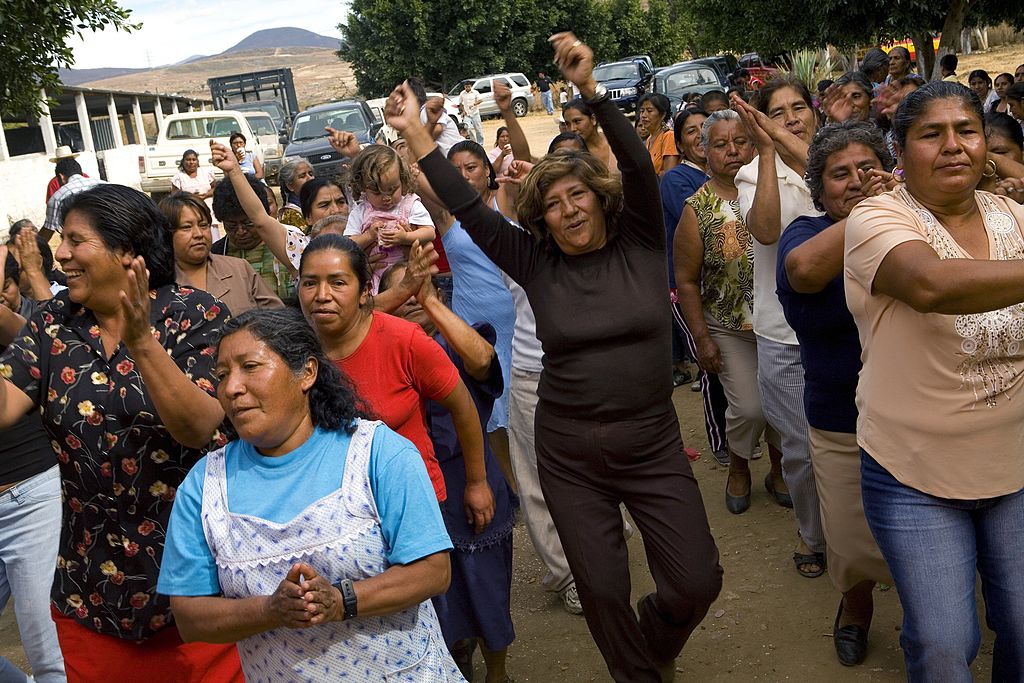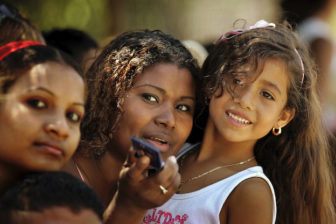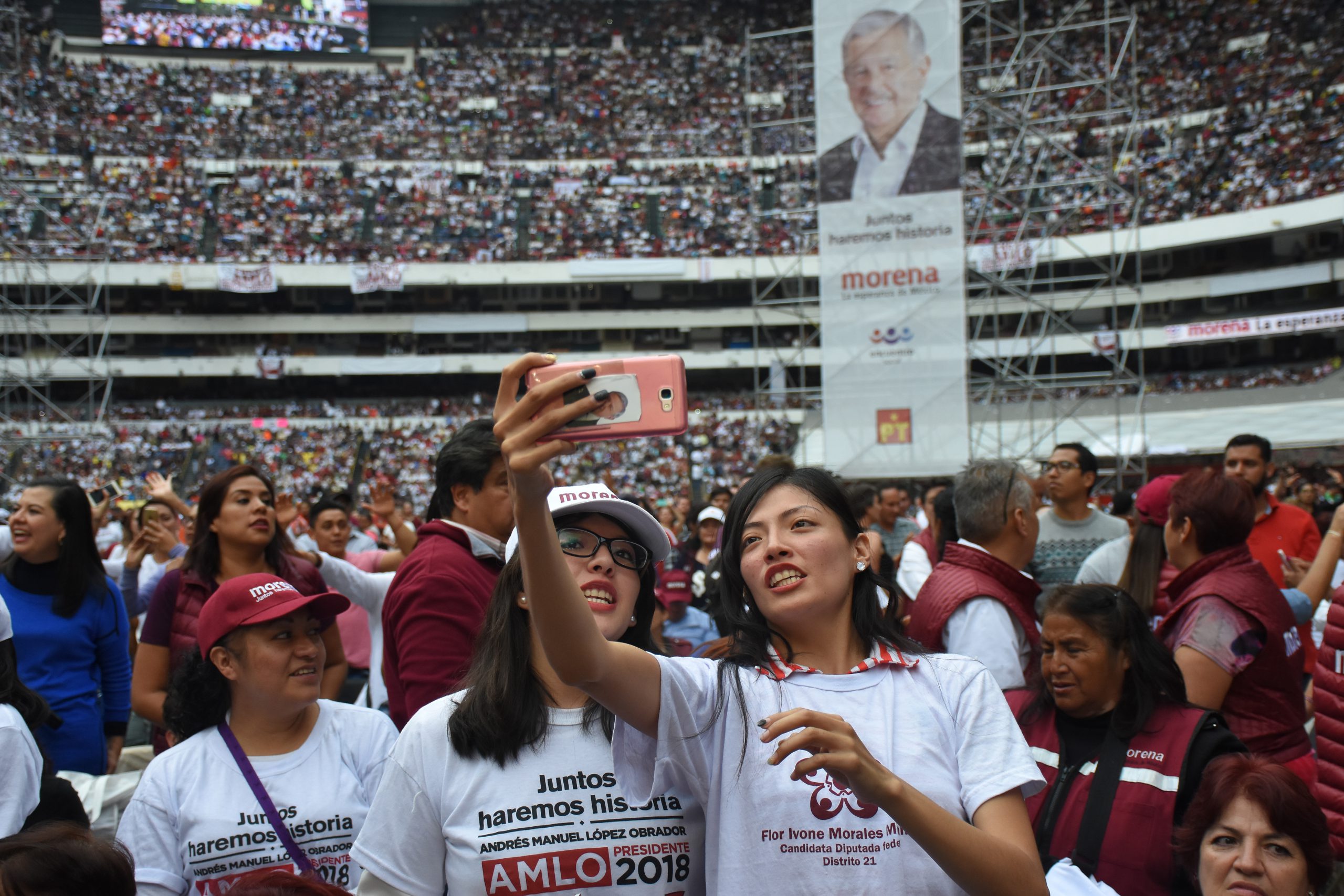In honor of Americas Quarterly‘s launch of its Summer 2014 issue on higher education and competitiveness, we asked first-generation college graduates from around the hemisphere to describe how they defied the odds to get their college degrees.
The six former students featured below—the first in their families to graduate from college—have since gone on to work for leading global companies, build their own businesses, conduct important medical research, and advocate for the rights of immigrants and disadvantaged young people. Their stories are an inspiring testament to the opportunities provided by a college degree, and to the critical importance of making a quality higher education accessible for all.
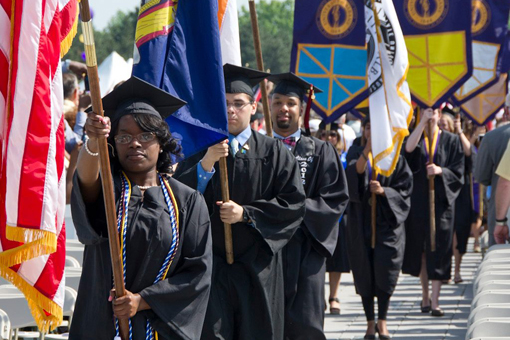
Victoria Bonds leads students in her graduation ceremony from the University at Albany. Photo and homepage photo courtesy of Victoria Bonds.
Read the six student profiles below:
Ana Loayza (artículo en español)
Cynthia Rodríguez (artículo en español)
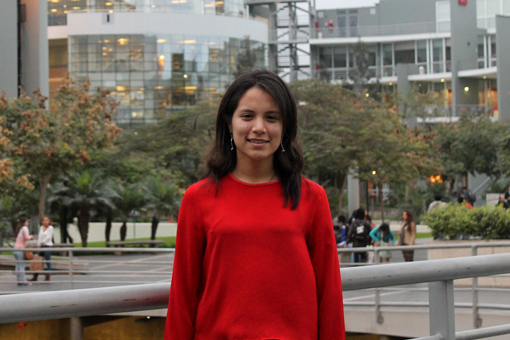
Ana Loayza en el Perú. Foto de Ana Loayza.
¿Qué le impulsó a buscar la educación superior?
En mi familia, la idea de educación superior siempre estuvo presente, incluso desde mi infancia. Mi papá fue coronel de la Policía Nacional y mi mamá es asistenta ejecutiva en una reconocida empresa en Perú. Ambos siempre han sido muy exigentes conmigo respecto a dar lo mejor de mí en todo: como estudiante, como deportista, como ser humano. Me inculcaron “ser la mejor”. No importaba que camino que escogiera, sino darlo todo en el proceso y soñar alto.
Ya terminado el colegio, la universidad se presentó como un escenario preciso para formar y fortalecer mis aptitudes, paralelo al crecimiento personal. Continuar mi formación en un área específica, que amara y reconociera como mi pasión en adelante, requería de formación universitaria.
¿Qué programa elegiste y porque?
Vivía jugando con mi imaginación desde mucho antes de pensar en arquitectura. Siendo niña, imaginaba historias, mundos, y aventuras de las que quería formar parte. Crecí en una urbanización nueva con terrenos vacíos que usaba de escenario para jugar. Hoy en día, mi urbanización está llena de casas y departamentos; es decir, jugaba rodeada de construcciones y edificios nuevos, observando el trabajo duro de los obreros, las visitas de los arquitectos, los aportes de los ingenieros, los contratiempos y soluciones.
Cuando cumplí 11 años, mi creatividad se enfocó en gráficos, colores, arte, formas y temas. Estas vivencias derivaron en un enamoramiento por el diseño y la arquitectura. La arquitectura resultó ser un espacio donde mi creatividad y lógica trabajaban de la mano. Amé la arquitectura desde el inicio. Conocer cuáles eran mis ambiciones, sueños, talentos y debilidades, me permitió ser acertada al momento de pensar en el futuro. La arquitectura se alineaba a mis intereses, forma de trabajo, carácter y pasiones.
¿Cuáles obstáculos enfrentaste para completar su título de grado?
Los obstáculos aparecieron siempre, y eso hizo mi vida universitaria más interesante. Los obstáculos ayudan a formar determinación y recordar cuánto amas lo que haces.
Estudié en la Universidad Peruana de Ciencias Aplicadas (UPC), en Lima. Cuando visitaba universidades, buscaba el mejor programa de arquitectura en el país y la UPC lo ofrecía. Eso me envolvió en un ambiente con jóvenes muy talentosos, competitivos y determinados. El nivel era intenso en términos de creación y producción. Mantener el ritmo era difícil; sin embargo, existía mutua inspiración entre alumnos y profesores, la cual es un factor de crecimiento profesional clave.
La formación de arquitecto, además, tiende a ser bastante específica respecto a las áreas de acción, siendo diseño, construcción y gestión de proyectos, puntos comunes. Durante mi formación, un reto fue ir más allá de mi zona de confort como estudiante y conectarme a una experiencia multidisciplinaria que contribuyera a mi formación como arquitecta. Me coloqué en nuevos entornos: programas internacionales, conferencias sobre soluciones globales y cursos de emprendimiento. Esto me llevó canalizar mis ideas, aprender a trabajar eficientemente en equipo, y manejar opiniones y visiones diversas.
¿A qué te dedicas ahora?
Mi sueño es impactar positivamente en el escenario de la arquitectura y el diseño nacional e internacional, contribuyendo a fortalecer el valor de la arquitectura producida en el Perú. Después de ganar experiencia en dos prestigiosos estudios de arquitectura en Perú, fue momento de iniciar mi propia empresa.
PER, estudio de arquitectura y diseño que fundé junto con amigos y colegas de la universidad, amplifica el radio de acción del arquitecto. Desarrollamos proyectos privados brindando propuestas innovadoras y creativas en arquitectura, diseño interior e imagen corporativa; y también, usando ese mismo talento, elaboramos proyectos y planes de responsabilidad social que impacten en comunidades donde la arquitectura pueda ser una herramienta para el desarrollo. Actualmente estamos diseñando, casas, oficinas y marcas, además de un proyecto de mejorar de viviendas en comunidades altoandinas. Trabajamos con amor porque queremos crecer de la mano con nuestro país.
Cynthia Rodríguez
Edad: 29
Ciudad natal: Lima, Perú
Alma máter: Universidad Peruana de Ciencias Aplicadas (UPC)
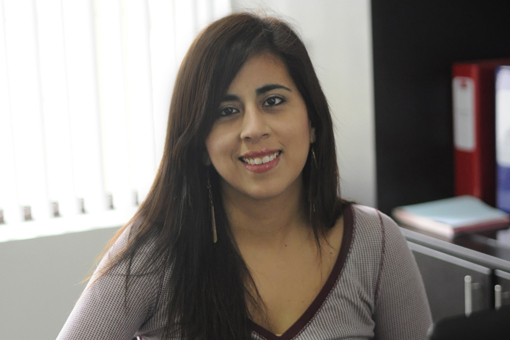
Cynthia Rodríguez en su oficina. Foto de Cynthia Rodríguez.
¿Qué le impulsó a buscar la educación superior?
Mi familia me impulsó a estudiar una educación de nivel superior. Mi padre es un hombre de negocios que prosperó gracias a su capacidad, intuición y sobre todo visión para llevar a cabo sus sueños. Ahora tiene una empresa con de 17 trabajadores, dedicada a la venta de empanadas y con un alto grado de responsabilidad social, ya que parte de su equipo son personas con síndrome de down y otras discapacidades.
Mi mami, también supo salir adelante; gracias a su capacidad para hablar idiomas, brindó clases en mi casa, dado que tenía que cuidar a mi hermana menor con discapacidad.
Trabajé y practiqué en la empresa de mi papá por un tiempo. Esto me permitió ayudarlo a estandarizar procesos, formalizar áreas y aplicar mis conocimientos en su empresa. Él comprendió la importancia de rodarse de profesionales para crecer de forma ordenada y eficiente.
¿Qué programa elegiste y porque?
Elegí el programa de ingeniería industrial de la Universidad Peruana de Ciencias Aplicadas (UPC)—primero de forma intuitiva, porque siempre me gustaron las matemáticas, la física y en realidad, números en general. Como siempre, estuve rodeada por los negocios por mis padres; me vi atraída por esta carrera, sobre todo por lo multifacética que resultó ser la ingeniería industrial.
¿Cuáles obstáculos enfrentaste para completar su título de grado?
No hubo obstáculos. Acabé mi carrera en 5 años y medio. A partir del tercer año, tuve que trabajar y estudiar para poder pagar mis últimos años de carrera.
¿A qué te dedicas ahora?
Hoy tengo mi propia empresa llamada Empanacombi, un servicio de comida rápida y un proyecto de vida para personas con discapacidad. Empanacombi es la primera empresa social en Perú, y me siento orgullosa de dirigirlo.
En Empanacombi, creemos en la capacidad de las personas con habilidades diferentes, es por ello que mi empresa está conformado con aproximadamente el 60% de jóvenes con diversos diagnósticos: retardo leve, síndrome de Down y discapacidad auditiva. Cada uno de nuestros colaboradores muestra sus habilidades con mucho empeño en su puesto de trabajo, demostrando que el espíritu no tiene discapacidad.
Mi deseo es inspirar a otras compañías a ser parte de la inclusión en nuestra sociedad. Empanacombi es un ejemplo de empresa social (certificada por el Ministerio de Trabajo) con un producto y servicio de calidad, demostrando que es posible ser sostenible, rentable y al mismo tiempo inclusivo. Es una empresa nueva con gente joven, decidida a cambiar la forma de hacer negocios en nuestro país. En este corto tiempo, se han obtenido diversos logros que nos motivan y afirman que la visión inclusiva se puede lograr.
Diego E. D Sola Di Lorenzo
Age: 25
Hometown: Caracas, Venezuela
Alma mater: Fordham University
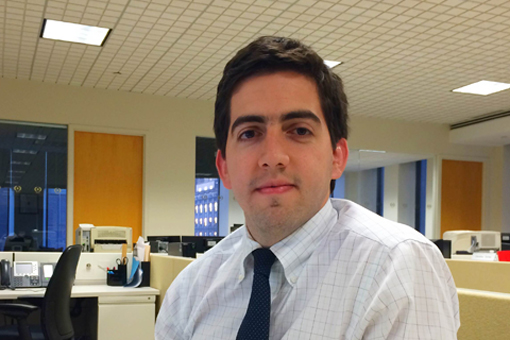
Diego E. D Sola Di Lorenzo in his office at work. Photo courtesy of Diego E. D Sola Di Lorenzo
What propelled you to seek higher education?
Even though my parents did not attend college, they understood the importance of a good education. In hindsight, I realize they got some crucial things right. For instance, I became fluent in English at a very young age thanks to a two-year stint at an American school in Caracas, Venezuela (Spanish was taught only once a week).
On the other hand, my parents were skeptical or even critical of established ideas like “an A student is a successful person in the future,” or “college is your best shot at getting a good job.” So I think inertia—the fact that most of my peers were preparing for college, taking entrance exams, etc.—played a major role in my decision to attend university. Still, I took three “gap years” between high school and college that I spent in China studying Mandarin.
My decision to go to China was in part a desire to learn another language as well as to do “something different.” I left Venezuela when I was 17 and my plan was to stay only for one year. For several reasons, the difficulty of the language being among them, I ended up staying three years.
What did you major in and why?
I majored in economics. Initially, I toyed with the idea of studying civil engineering. My dad was in the construction business, and somehow I saw myself taking a similar career path—the typical story of a son following his parent’s footsteps. At some point, I realized economics was more in tune with my interests. While living in China, I also decided not to go back to Venezuela for school but to seek an American institution instead (Fordham University).
What were the obstacles that you faced to complete your undergraduate degree?
I think my biggest obstacle was a lack of discipline—a general difficulty in engaging with a subject or studying rigorously, handing work in on time, etc. I remember clearly that from kindergarten through primary school, I was a fairly good student. This was mostly thanks to parental pressure and to in-house tutoring by my mom. During high school, however, that family stimulus diminished and I lost my drive to obtain good grades. I became a mediocre student. When I decided to turn my grades around during college, I realized that my lack of discipline during high school had lingering effects.
What do you dedicate yourself to now?
I work as an analyst at Bank of Tokyo-Mitsubishi in the Latin American investment banking division.
Kim Yu
Age: 27
Hometown: San Diego, CA
Alma mater: The University of California, San Diego (undergraduate); New York University (graduate)
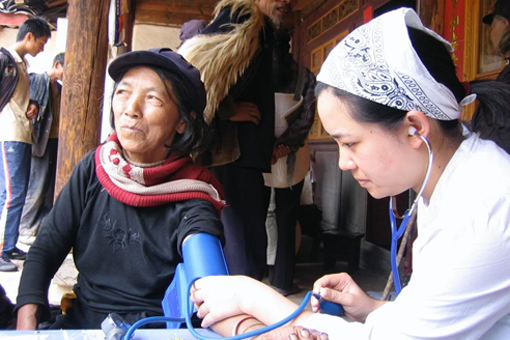
Kim Yu with a patient at a health clinic in Yunnan, China. Photo courtesy of Kim Yu.
What propelled you to seek higher education?
I was always taught to value education, and there was never a question that I needed to attend college. My parents were immigrants from Taiwan, and my father came to the U.S. on a student visa, but he could not finish his degree because my mother was pregnant with me. So a part of me wanted to finish what they could not.
What did you major in and why?
I majored in human biology with a minor in Chinese studies. Because I was always interested in health and medicine, I thought that it would be a good degree for me to explore possible careers in health. Of course, when I started school, I thought the only careers in health care were doctors and nurses, but I realized through my education that there were plenty more opportunities in health care.
I chose to minor in Chinese studies so that I could learn more about Chinese culture and language, and believed this would help me in my future career.
What were the obstacles that you faced to complete your undergraduate degree?
When applying for college, I had very little help at home and sought out assistance from friends who had parents that did attend college. Since I had always helped my parents by proofreading their English letters and emails, turning to them for help to write my application was not an option.
The only components of my college application that I asked my parents about were the location of the school—they did not want me to move far away—and the cost of the application fee. Once in college, I had very little knowledge about the various options for graduate degrees.
To this day, I don’t think that my parents fully understand my graduate degree (public health) or my work. In addition, attending a school with many Asian Americans, I realized that many of my peers assumed that I was “smart” and came from a highly-educated background, when that wasn’t necessarily the case. I felt that I needed more academic support at times, but struggled to navigate the college academic system for some time.
What do you dedicate yourself to now?
I currently conduct research among injection drug users, looking at the efficacy of different models of treatment. My passion is to serve and improve health care for communities and populations that have been historically neglected.
Victoria Bonds
Age: 23
Hometown: Endicott, NY
Alma Mater: The University at Albany
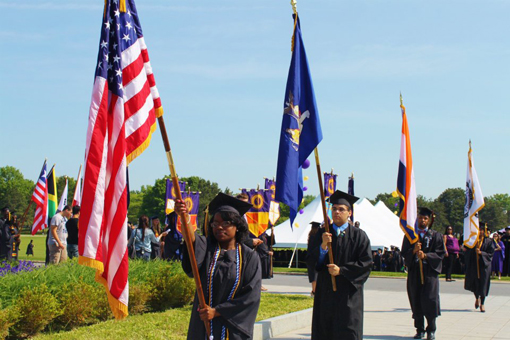
Victoria Bonds leads students in her graduation ceremony from the University at Albany. Photo courtesy of Victoria Bonds.
What propelled you to seek higher education?
My parents always encouraged me to always strive for the best and to always be the hardest worker. But my participation in the TRIO program Upward Bound—one of several U.S. federal programs to increase access to higher education for disadvantaged students—was also an important factor. Thanks to this program, I spent my high school summers preparing academically for the upcoming school year. I also went on college tours, spoke with admission directors, and was able to personally see what my parents had spoken about only vaguely. It was through this program that I received assistance filing financial aid, writing my personal statement, and applying to various colleges and universities. I knew I was capable of being a successful first-generation student, and it was important for me to set a standard that would be followed by my younger siblings, nieces and nephews.
What did you major in and why?
I majored in social welfare and minored in public policy at the University at Albany. There are various reason why I chose this major. First, I saw my biological parents become guardians, foster parents, mentors, and adopted parents to various children and teens in my childhood. Throughout my childhood, I cannot recall a moment when they turned away a child in need, nor do I remember them treating anyone differently; we were all family.
In high school, I was the leader of a step team—and within this tight-knit group, we faced various issues individually and collectively. But what was unique about that environment of refuge was speaking about our challenges, sharing experiences on how we overcame them, and ultimately learning from each other’s experience. I learned the value of the collective to heal each other. These and many other experiences increased my eagerness to help people stomp through their personal issues (micro interventions) and create vehicles of access and opportunity (macro and policy) in any way that I could.
What were the obstacles that you faced to complete your undergraduate degree?
There were always financial challenges, because I financed my education on my own through loans, scholarships, jobs and on-campus job opportunities—like serving as a resident assistant (RA) and housing manager (HM) in the Department of Residential Life—to offset the expenses. Also, as a first-generation college student, I placed a lot of pressure on myself to disrupt the cycle and successfully complete my undergraduate degree.
In addition, there were issues and challenges at home that I was constantly trying to manage. My father had a stroke during finals week of my junior year, and it completely turned my family upside down. Now there was a loss of income, and I wanted to contribute.
Nonetheless, the principles that my parents instilled in me continued to be a contributing force to overcoming these challenges. During my time at UAlbany, I was member of a TRIO program known as Project Excel. This program is specifically designed to service first-generation, low-income, and disabled students—and it allowed me to stay engaged, feel supported, and serve during my undergraduate years. I served as a peer mentor, student assistant, and honor society vice president. The support from the staff—and in particular, Dr. Christopher Fernando, the director of the Office of Access and Academic Enrichment—changed my entire college career.
What do you dedicate yourself to now?
I’m a Public Allies Fellow in New York City. Public Allies is an organization that focuses on advancing new leadership to strengthen communities, nonprofits, and civic engagement. I work with United Way of New York City on the Attendance Improvement Dropout Prevention Program. In addition to this work, I continue to mentor young female college students who are experiencing some of the same challenges I experienced and to serve as a resource and support system for them.
Ultimately, I dedicate my life to finding opportunities that will allow me to help create access for others. Throughout my life, I worked hard and was fortunate to gain access to various opportunities, and I hope to provide them for others in my present and future work.


